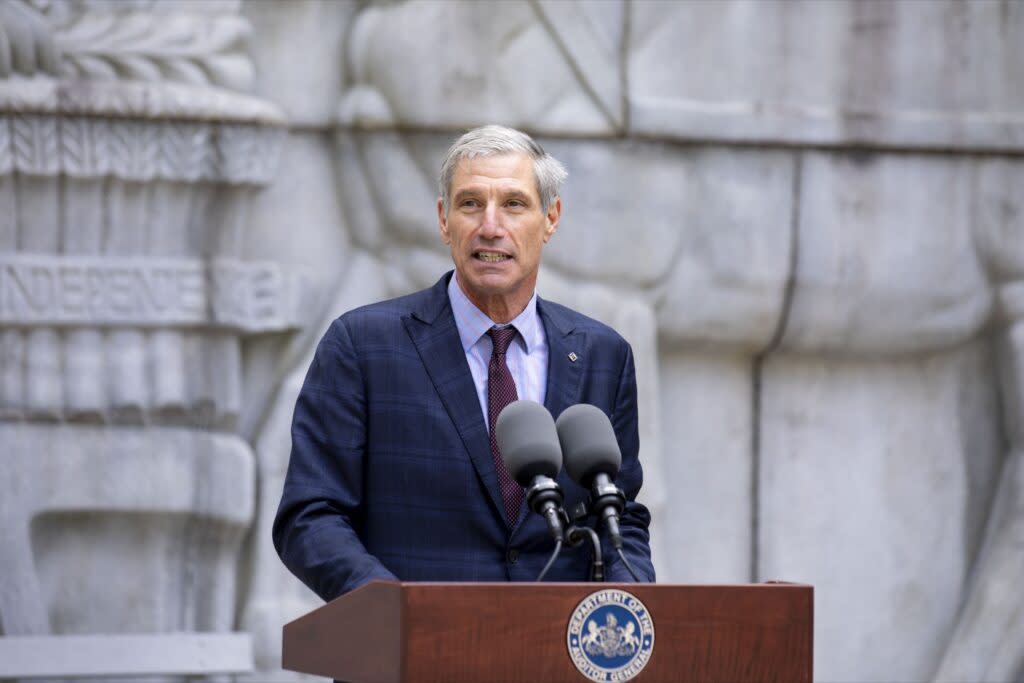Chancellor who oversaw Pa. state university restructuring to resign in October

- Oops!Something went wrong.Please try again later.
Pennsylvania State System of Higher Education Chancellor Daniel Greenstein speaks at a press conference on Oct. 18, 2022. (Commonwealth Media Services)
The chancellor of Pennsylvania’s state-owned university system said he will resign in October after overseeing a partial restructuring of the 10-school system as it faced enrollment declines.
In an open letter to students and faculty, Pennsylvania State System of Higher Education (PASSHE) Chancellor Dan Greenstein said he is resigning to pursue a “compelling opportunity … to work nationally. Greenstein did not say in his letter what his new position would be.
Greenstein’s resignation will be effective Oct. 11, his letter said.
“For six years, I have poured my heart and soul into our system, its people, mission, and places,” Greenstein said. “My passion for our work, students, and cause is unwavering. A significant amount of good, critical, and undoubtedly hard work is yet to be done for our students, their communities, and Pennsylvania.”
But, Greenstein noted, higher education in the United States is struggling on many levels and in many ways.
“The risks are profound. The crises are real. And the students — the people — that I care about the most are in danger of being left further behind,” Greenstein said about his decision to take his new position.
Speaking at Shippensburg University, one of the 10 PASSHE schools, on Tuesday, Gov. Josh Shapiro thanked Greenstein for his service over the last eight years.
“I think it is a personal decision for Dan. He’s done an outstanding job. We are grateful for his service,” adding that Cynthia Shapira, the chairperson of the PASSHE board of governors would oversee the process of identifying Greenstein’s replacement. “I believe it will be a national search process to bring in a new chancellor to lead us forward.”
Greenstein oversaw the consolidation of six PASSHE universities into two regional universities as the system faced declining enrollment and stagnant state funding. As the PASSHE board grappled with the reality that the status quo, in which the more affluent and highly enrolled schools subsidized the others, could not continue, Greenstein said he would recommend dissolving the system if the consolidation plan was not approved.
Although the plan faced opposition as lawmakers fought against a 14% reduction in PASSHE’s workforce, the board approved the plan in March 2022.
Last week the board of governors voted to keep tuition level for in-state students for the seventh year running.
State Rep. Jesse Topper (R-Bedford) said Tuesday that Greenstein did not shy away from addressing the system’s many challenges.
“There is no doubt in my mind that the students who attend these institutions are in a better position to succeed thanks to his tireless efforts. It has been clear to me that student achievement is what drives Dan in his approach as chancellor, and I believe he has set a wonderful example for those in leadership roles in higher education,” Topper said in a statement.
In his March budget address, Shapiro called for a further sweeping higher education reform by merging the PASSHE universities with the state’s 15 community colleges under a single governance structure. The proposal included a 15% increase in funding to the new system and a $1,000 per-semester cap on tuition for low- and moderate-income students whose families earned $70,000 a year or less.
Shapiro also called for a $1,000 increase in Pennsylvania Higher Education Assistance Agency grants to private university students and a performance-based system to distribute state funding to Pennsylvania’s state-related universities, the University of Pittsburgh and Lincoln, Penn State and Temple Universities.
The budget package passed earlier this month included legislation to create a statewide board of higher education to oversee coordination between Pennsylvania colleges and universities and a Performance Based Funding Council to develop a new system to recommend funding levels for the state-related schools.
Asked whether the compromise accomplished his goal, Shapiro said it creates new opportunities for collaboration to better serve the commonwealth’s higher education needs.
“It allows us to put a better product out there for students to learn from one another, to not have our institutions competing with one another, but rather working collaboratively,” Shapiro said.

